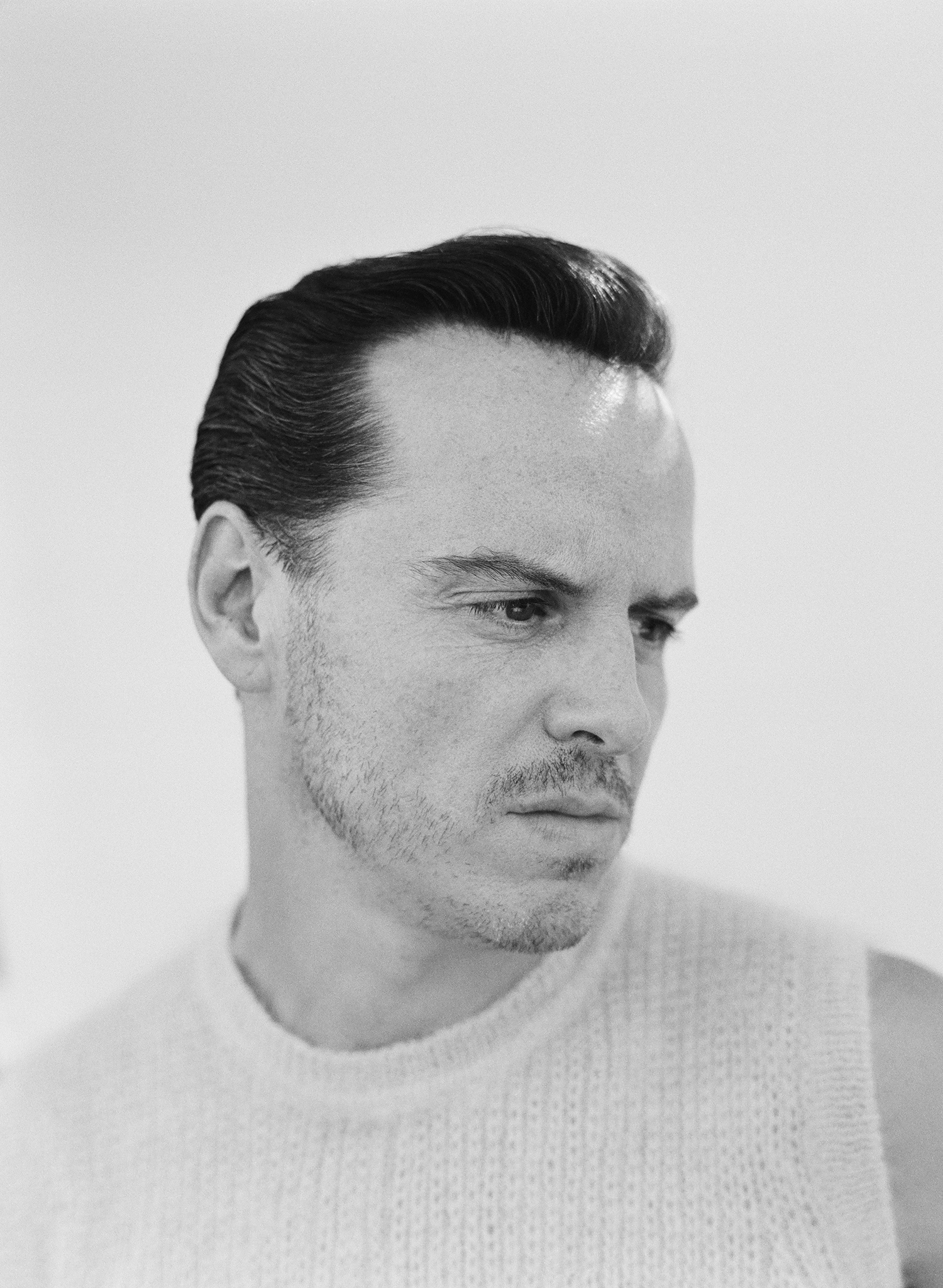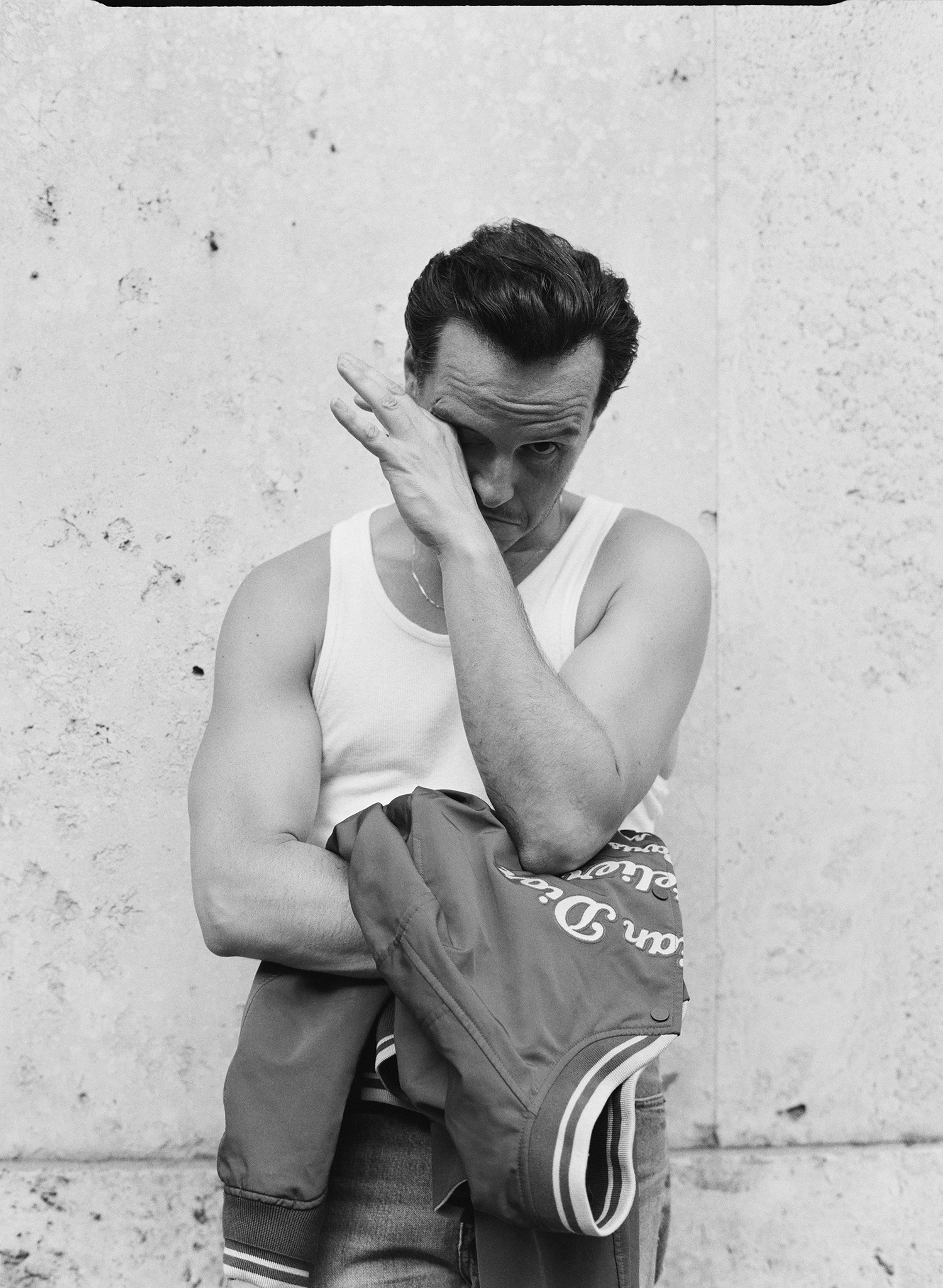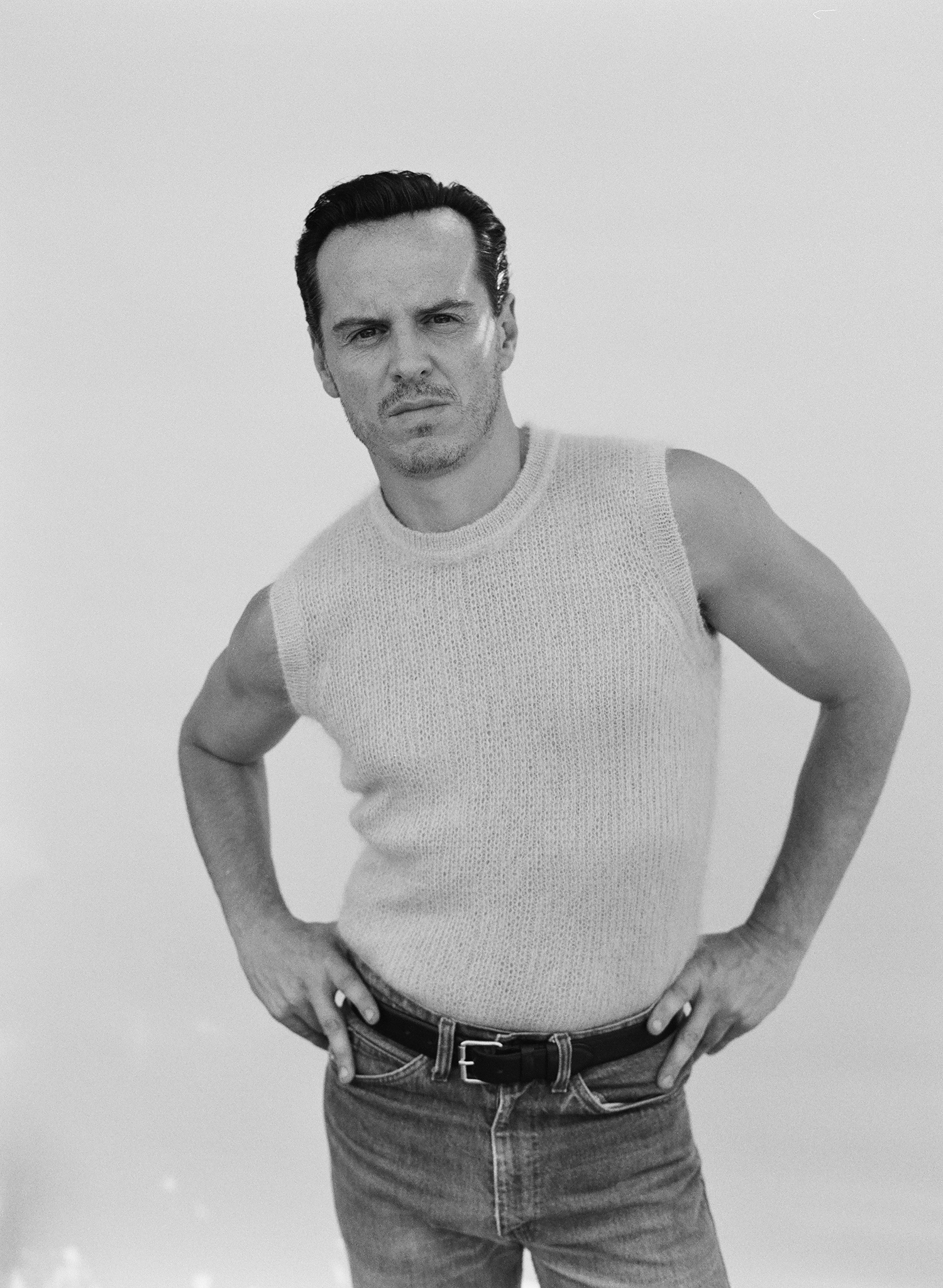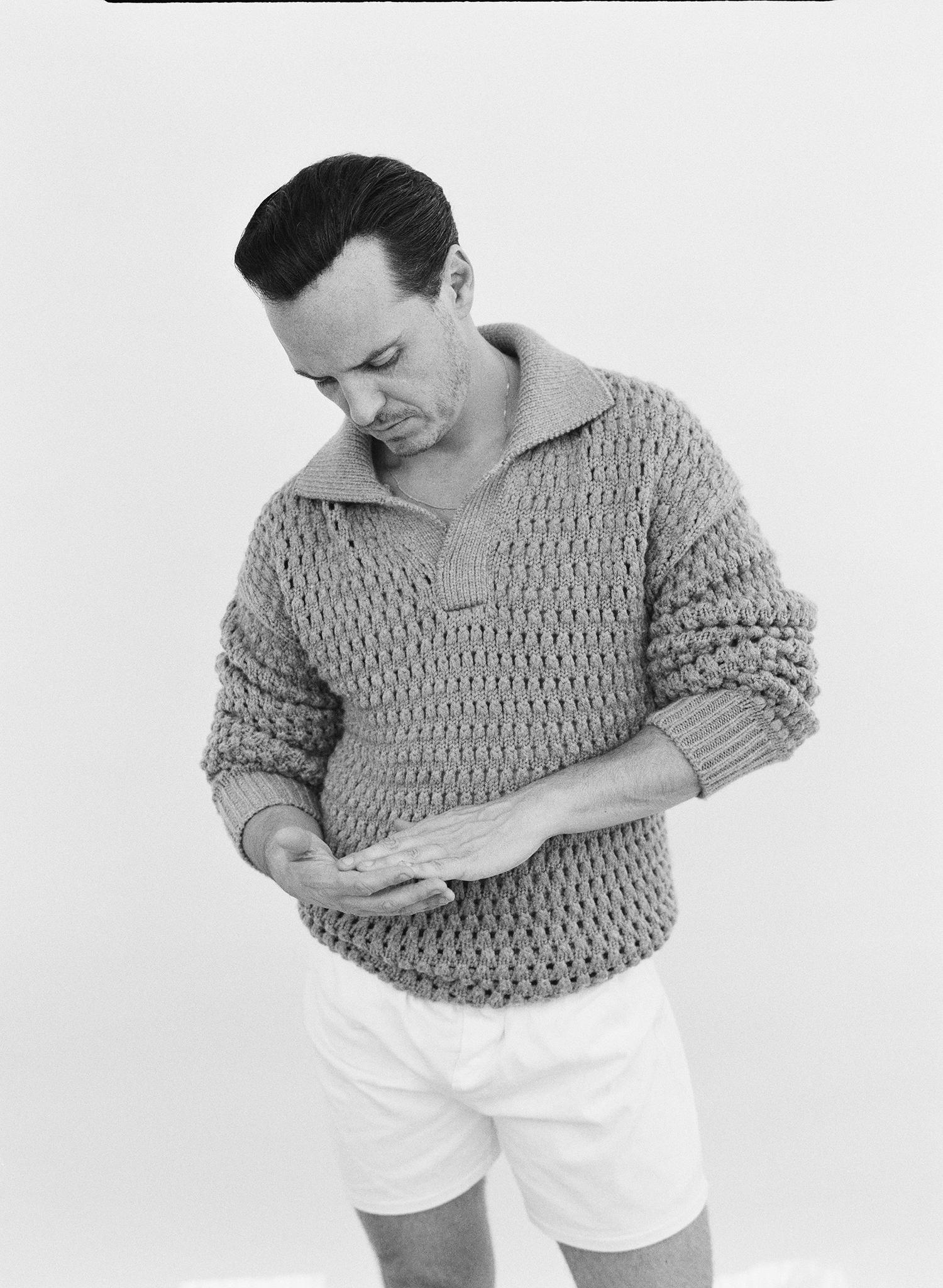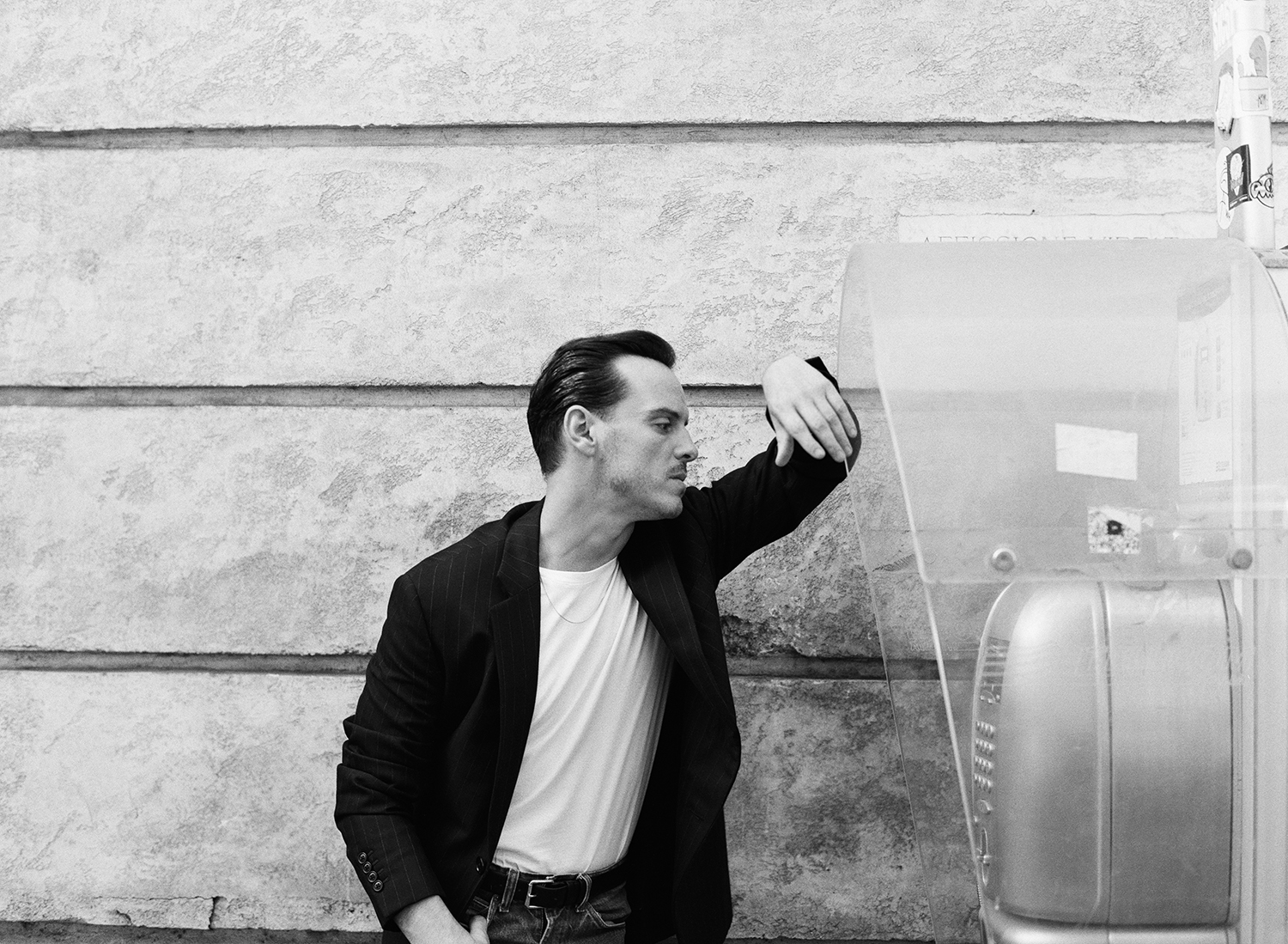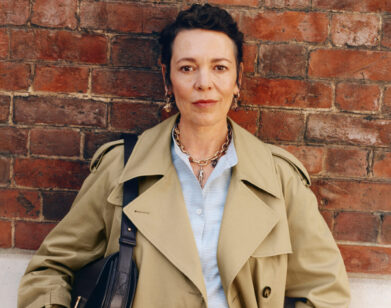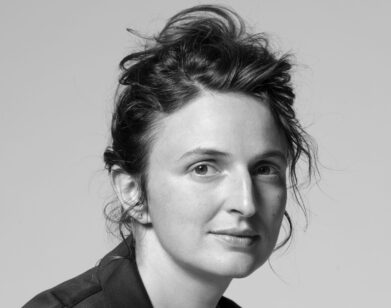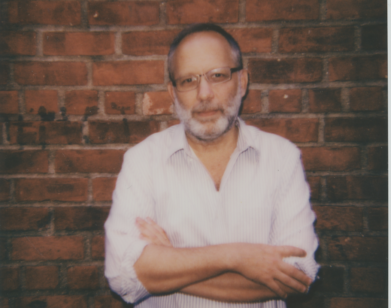Oh, God!
Andrew Scott and Ben Whishaw on Sexuality, Chemistry, and Imagination
———
Hot Priest. The weapons-grade charisma that Andrew Scott deployed on season two of the Phoebe Waller-Bridge tragi-comedy Fleabag was so intense that the 44-year-old actor will forever be linked to those two words. But Scott, who began acting when he was a teenager growing up in Dublin, has also been a Hot Beatle (Lennon Naked), a Hot Supervillain (Sherlock), a Hot Danish Prince (Hamlet), a Hot Lieutenant (1917), and, most recently, a Hot Lord, in the period miniseries The Pursuit of Love. Up next, he’ll play a Hot Sociopath in the Showtime series Ripley, based on Patricia Highsmith’s Tom Ripley novels. But first, he reconnects with his former costar Ben Whishaw for, you guessed it, a hot conversation.—BEN BARNA
———
BEN WHISHAW: I just finished watching The Pursuit of Love last night. It’s so wonderful. Have you watched it?
ANDREW SCOTT: I have, but I skipped over the bits that I’m in. I’ve seen some of the bits I’m in too, because you don’t want to be silly about it, but it’s so hard watching yourself. But I had a brilliant time working on it. We did it in the middle of the pandemic.
WHISHAW: I could tell that you enjoyed being in that world, and that you have a personal affinity with that world and that character. Do you seek out those affinities when you read a script?
SCOTT: I certainly did in this case. Having worked in the industry for a long time, you do realize that it’s about who you work with. Because you don’t make films alone. I’ve been really lucky in the past few years to work with people who I love as people. There’s something about Emily [Mortimer], who I know you know well—she’s just an incredibly special person.
WHISHAW: She reminds me of you, in that I feel extremely free with her. I feel like there’s nothing that can’t be said or discussed or laughed about.
SCOTT: There’s something about that attitude, particularly the idea of laughing at the world, that is very sensible. Nancy Mitford was writing around the time of the war and there are people in the world who, when the shit hits the fan, are able to say, “This is funny, you have to find the lightness.” And there are people who, when a catastrophe happens, it matches the inner sense of, “We’re all fucked, so we might as well just drown in our own negativity.” At the moment, I find that to see the world as a bleak place is admirable. We’re very worried about saying the wrong thing, and I do like that we’re not allowed to say whatever the fuck we want anymore, but I also think it’s important that we maintain a sense of the individual, and sometimes you have to say things that are audacious. That doesn’t negate being a kind person. It just means we are all doomed. Ultimately we are all going to die, so before we do, having a party is a wonderful thing.
WHISHAW: Absolutely. I know that you love Esther Perel. I looked her up on YouTube and she said something brilliant about how it’s a time when there’s a loss of eros. Because we’re all completely hyper-fixated on safety, the thing we can’t have is spontaneity and wild happenstance. Everything’s quite confined, isn’t it? I was wondering how you were dealing with that, because I know you are someone who, in your work and your life, thrives on that.
SCOTT: To be honest, I find it really difficult. At the beginning, I found it sort of wonderful that the illusion of freedom and choice is just that, and actually, we’re not in control. I liked the idea that there’s a different way of living. There are people who have had a very set way of thinking, myself included. But as the pandemic has gone on, I find it more difficult. I realized I’m very much a people person. I miss my tribe. I love the idea of being in a group of people who are doing the same thing, and I find the making of our work really hard. I find the fact that all the crew has to wear a mask really difficult. To try and break through the masks and fear, in order to create a playful atmosphere, is a really difficult thing to do. I know for both of us, theater is such an important thing, and the fact that it isn’t going on is hard. When you haven’t done a play in a while, you go, “I want to go back and play with that part of myself.” That sounds creepy, but even if you’re not doing it, the fact that it’s going on is comforting. I find it really scary and it fucks with your identity a little bit. But I love that idea of eros. I associate it with being a bit of a sex creep, but actually, it just means playful. It’s energy and love of life.
WHISHAW: I suppose it can mean all sorts of things, but it definitely has something to do with sex as well.
SCOTT: I think that’s true, because you can get everything delivered to you by a company and wear a tracksuit and survive. But something in you is muted and I find that really scary. It’s wonderful being in Italy at the moment because people really dress up here to go out. Life is to be celebrated.
WHISHAW: I’m going to blow smoke up your ass a bit. I can completely understand why you’d be missing work, because when I watch you, there’s an intensely alive quality. It sounds like such an obvious thing to say, but you’re completely open to the moment. I’m curious as to where that fearless quality comes from and if you’ve always felt that?
SCOTT: Acting is about playing. Once you’ve done all your work, and learned your lines, and you trust the people, you have a framework in which you can play, namely: good writing. That’s the thing I’m addicted to. When you’re making a movie your imagination is constantly interrupted, but there’s something about the theater where there are 800 people there who willfully put themselves in a darkened room in order to be transported somewhere, and you all go somewhere together.
WHISHAW: [Laughs] I was thinking of how we were probably very different then and also how different the world was. What do you think about the change that’s happened in you and in the world? Specifically in terms of being out, or being a gay man who is also an actor?
SCOTT: What I remember, clearly, is going to sleep in that dressing room between shows. Two little gay sleepers. It was really special because both of us had an opportunity to play a loving and beautifully written relationship. The fact that we were both gay was kind of usual. At the time, a lot of those parts were played by gay people in the theater, but not necessarily in film and TV. Or there was a bigger fear that you wouldn’t be able to play a range of parts. I don’t know if you’ve gotten advice on that front, like, “Just keep that low-key.” I remember us speaking a lot about that at the time. There weren’t very many out actors around, doing exciting work. Now there’s all different types of sexualities and genders, and I find that really exciting.
WHISHAW: There must have been some kind of assumption that if you cast a gay actor in a straight role, that required heterosexual women to find them appealing, that you wouldn’t be able to achieve that if you cast a gay actor, which is obviously insane.
SCOTT: Chemistry, which is what is required in order for people to believe things, isn’t about sex; it’s about something else. It’s what we were talking about earlier: eros, a sense of playfulness, an idea of imagination. One thing I do feel grateful to have is a sense of imagination. Whether that’s a sexual imagination, or something I feel.
WHISHAW: It’s all fiction or a dream, anyway.
SCOTT: There is no real Batman! The pleasure is knowing the person is actually pretending to be somebody else. So surely, the idea that a gay person is pretending to be a straight person is even more fun. All things being equal, everybody should be allowed to play everything, but all things aren’t equal unfortunately, so that’s why representation is so important. But to be in the empathy game, and trying to imagine what it’s like to be in someone else’s shoes, is very honorable and necessary. That’s why I find it frightening when they say, “You have to stay in your lane,” because that’s not what the skill is. When I was a kid I used to read Empire magazine, and they had this article, “Things That People Will Believe in the Year 2050,” or something like that. It said something like, “Gay people can play leading parts in movies.” I remember thinking, “That probably won’t ever happen.” So the fact that I see it happening now—and I’m not saying the war is over, so to speak—without the same prejudice that existed before, is wonderful. I still maintain that talent is talent and I will never want anyone to get cast because it’s going to tick a box.
WHISHAW: You are a private person. How do you navigate that? Do you ever feel like you have to be a spokesperson or be banging a drum for a cause? Particularly as the world gets more insane and the problems mount up, do you ever think, “Should I be using this platform?”
SCOTT: I’m hesitant to do that. I do have that question, sometimes. If I had a public Instagram, that might have some influence, but everyone has an opinion now, and it’s pretty clear that I feel that I have a responsibility to be an authentic artist, without sounding too lofty about it. The kind of actors I admire never really say anything about anything. But that was a different time to a certain degree, and there was something about being private before that was very respectable. But I don’t want privacy to be a respectable disguise for being secretive and closed. I want to live in opposition to the way that I used to live, when I was struggling with sexuality and everything. I’m certainly private. I don’t want to speak to a journalist in the same way that I wouldn’t go up to somebody I didn’t know in a pub and say, “Listen, this is who I want to sleep with, do you want to know?” But I’m not particularly private with the people that I love. It’s not that I’m above speaking about things I feel passionate about, it’s just creating a balance, isn’t it?
WHISHAW: Despite what you said earlier about how weird it is to make things with masks and social distancing, how are you finding Ripley? Are you managing to have that connection with the other actors?
SCOTT: It’s a hard one, because in our version, he’s a very lonely character. You see him on his own quite a lot. I find that difficult, and I find not having the actors around as much as I would like to be difficult. But it’s an extraordinary character.
WHISHAW: Tell me more about him.
SCOTT: There’ve been various iterations of the character, some of which I’ve seen and some of which I’ve avoided. When you’re playing those famous literary characters, you don’t want to just copy. I’m interested in the idea of what queerness is, and otherness, because that’s what I think it’s about. The reason he’s such an interesting character is you can’t quite place him.
WHISHAW: He’s almost like a ghost.
SCOTT: That’s exactly what I’ve been thinking, Ben! If Tom Ripley was in a gay bar, I’m not sure that he would fit in there. Nor do I think he’s a straight character. I think he’s a queer character, in the sense that he’s very “other.” What’s his relationship with sex, or death, or with family or friends? It’s interesting that a character is the sum of the parts that you don’t have to play. Why do you love Patricia Highsmith so much, by the way? And when did you read the books?
WHISHAW: I first read The Talented Mr. Ripley just after I left drama school, and then five or six years ago, I read them all in one summer. I love that world. I only feel sad that I’ve had that experience and can’t ever have it again. I have to wait until I forget what happens. There’s nothing politically correct about her. All the central characters are amoral, and behave in completely irrational, if not despicable, ways. It’s dark.
SCOTT: We are dark. There’s a trend in drama at the moment to make things accessible and make the characters accessible. What’s their backstory? What’s wonderful about Tom Ripley is that you have no idea. You sometimes hear about his backstory but you’re a bit like, “Is this made up?” Sometimes the reason we feel unnerved by certain people is because we don’t know their backstory. It’s necessary for us to have stories that are dark. Art is about showing us who we are, not who we should be.
WHISHAW: I couldn’t agree more.
———
Hair: Giulio Ordenselli using Label M at Studio Repossi
Makeup: Samia Mohsein at Making Beauty Management
Fashion Assistants: Arnaud Buisson and Silvia Pirolli

